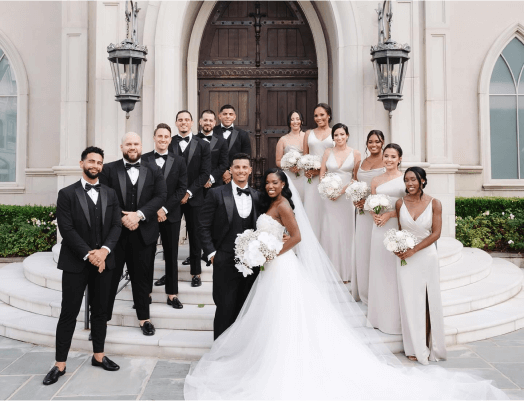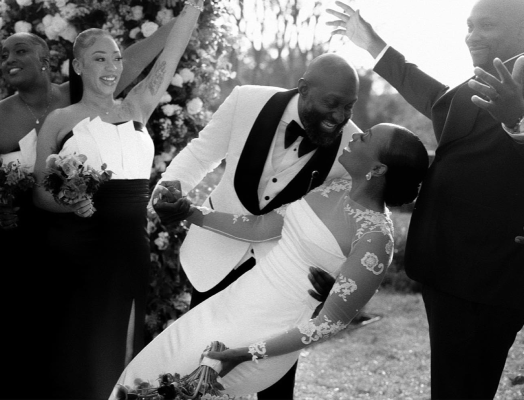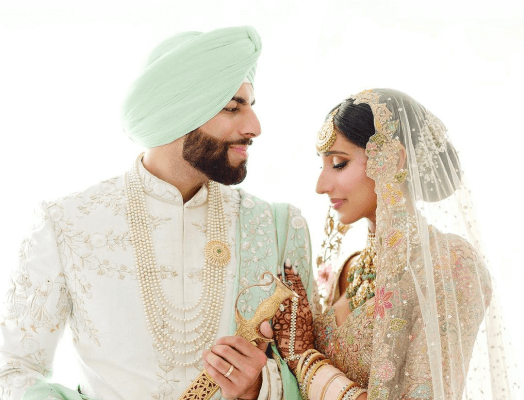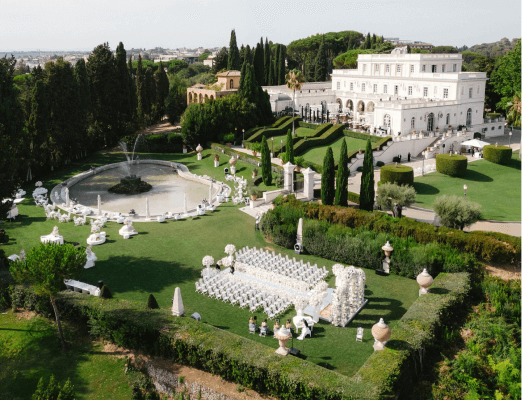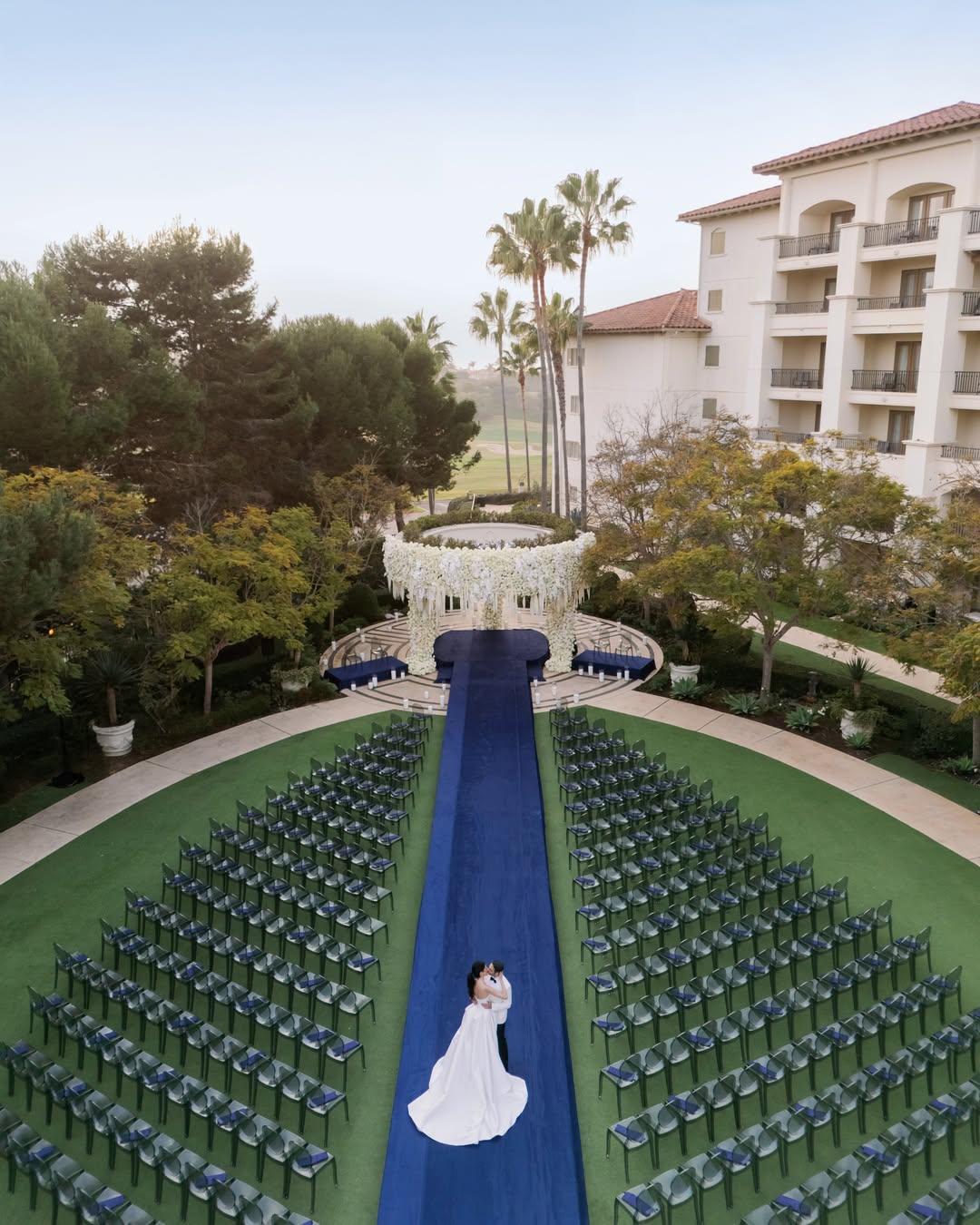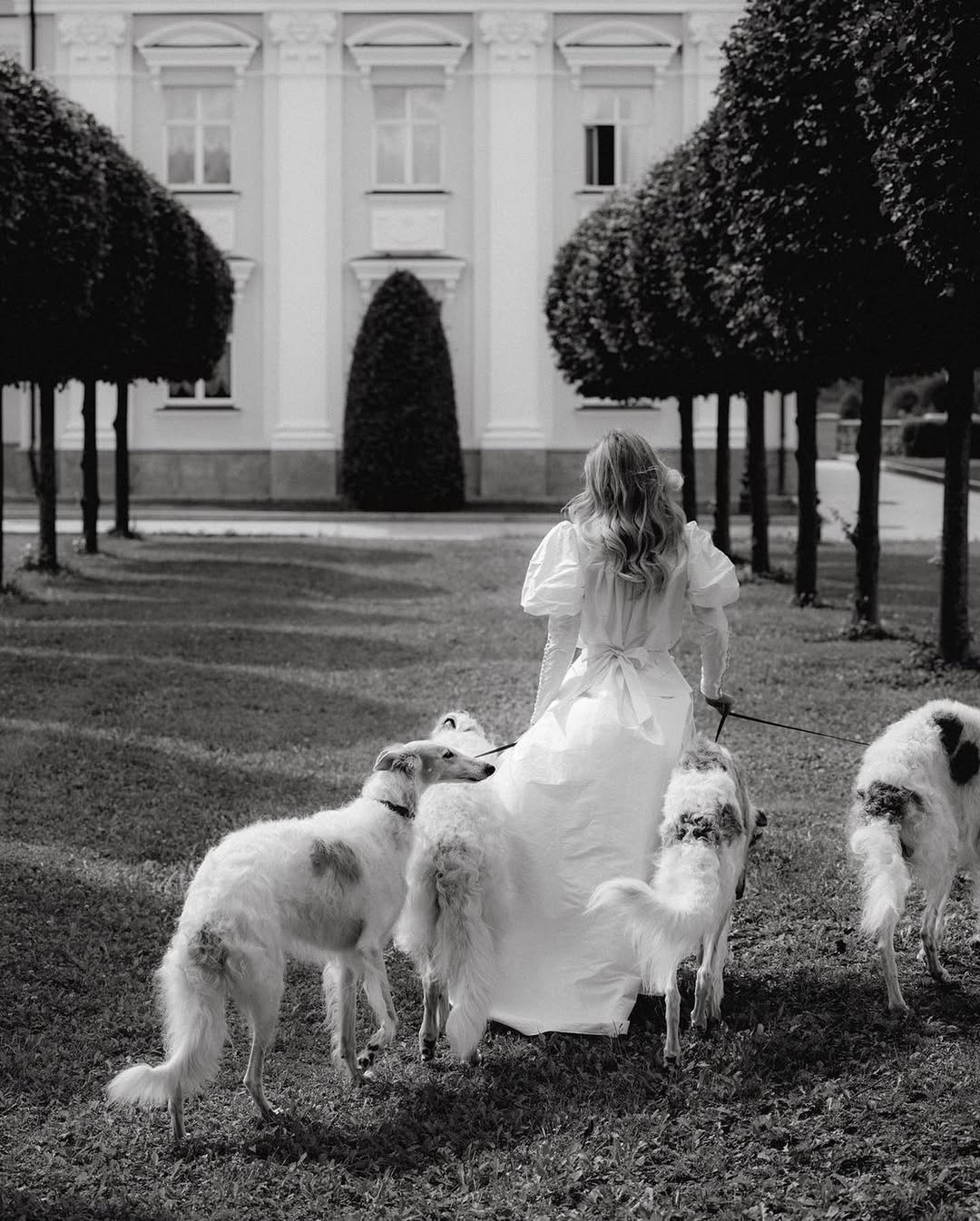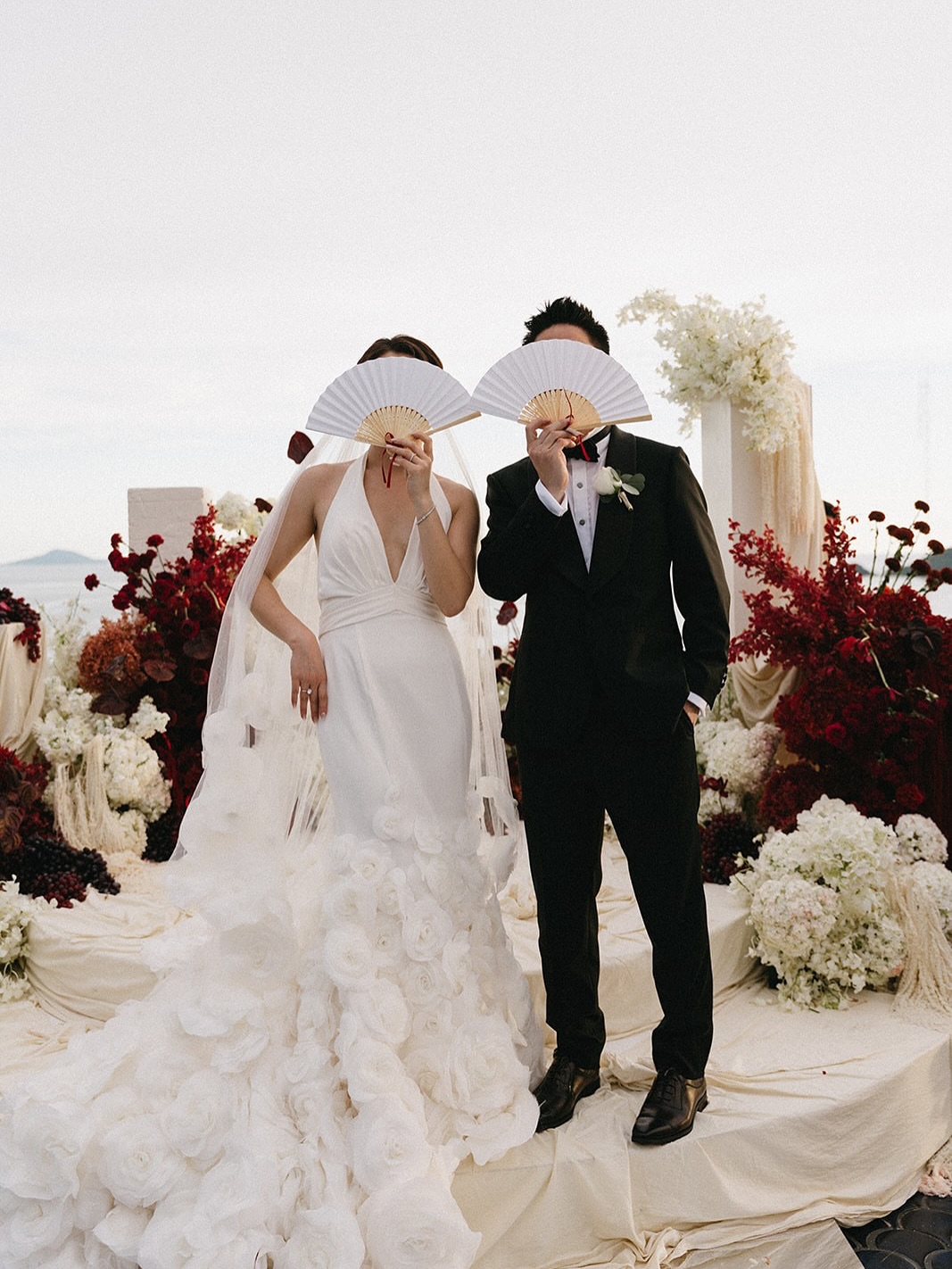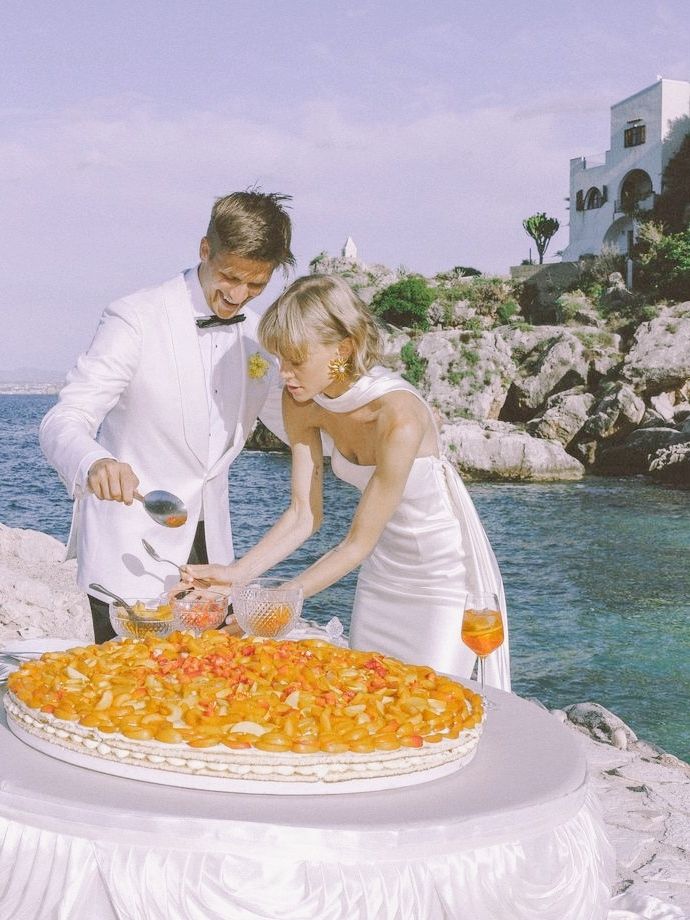How to Plan a Destination Wedding in Morocco: Complete Guide
- Author: Natali Grace Levine
- Reading time: 28 min 19 sec
- Publication date: 07/11/2025
- Updated: 08/21/2025
- Legal Must-Knows for Planning a Wedding in Morocco
- How Much Does a Destination Wedding in Morocco Cost?
- All About Morocco Wedding Packages: What’s Included?
- Top Morocco Wedding Destinations Worth the Hype
- Choosing the Perfect Wedding Planner in Morocco
- How to Pick the Ideal Moroccan Wedding Venue
- Finding Top-Rated Morocco Wedding Photographers and Videographers
- Morocco Wedding Guide: The Most Breathtaking Locations for a Photoshoot
- Irresistible Menu Ideas for a Delicious Moroccan Destination Wedding
- Creative Styling Tips for Your Luxury Moroccan Wedding Decor
- Morocco Wedding: Dress Codes and Style Advice
- Entertainment Ideas to Make Your Morocco Destination Wedding Unforgettable
- Where to Stay: Best Wedding Accommodations Across Morocco
- Stress-Free Transport Tips for Getting Around on Your Moroccan Wedding Day
- Thoughtful Moroccan Wedding Favor Ideas to Thank Your Guests
- Top Things to Do Before and After Your Wedding in Morocco
- Host a Rooftop Welcome Dinner
- Your Ultimate Packing Checklist for a Destination Wedding in Morocco
- Morocco Wedding Traditions to Include in Your Celebration
- Wedding Etiquette in Morocco: Respecting Local Traditions and Culture
- Language and Communication Tips for a Smooth Wedding in Morocco
- Health and Safety Advice for a Carefree Moroccan Wedding
Morocco has a way of leaving a lasting impression. With its vibrant colors, centuries-old architecture, and rich cultural traditions, it’s a place where every corner holds a story—and for couples planning a destination wedding, it offers something truly special. From the lively souks of Marrakech to the golden calm of the Sahara, Morocco blends celebration and heritage in a way that feels effortless and deeply romantic.
Planning a wedding abroad can be a big task, especially in a place as unique and layered as this. But with the right guidance, it becomes an exciting journey—one that leads to an unforgettable experience for you and your guests. This guide was created to walk you through every detail: legal steps, budgeting tips, venue ideas, cultural etiquette, and all the small touches that will make your Morocco wedding feel beautifully personal.
If you're dreaming of a wedding that’s filled with soul, style, and a sense of adventure—welcome. You’re in the right place.


Find Your Perfect Wedding Vendors
Legal Must-Knows for Planning a Wedding in Morocco
Before you start choosing florals or scouting riads, it’s important to understand the legal side of getting married in Morocco. The process can vary depending on your nationality, religion, and whether you plan to have a legally binding ceremony in Morocco or simply a symbolic one.
Can Foreigners Legally Get Married in Morocco?
Yes, but it’s not always simple. The legal marriage process in Morocco is governed by local laws, and those laws differ significantly depending on your background. Here's a basic breakdown.
If one of you is Moroccan: You may be able to legally marry in Morocco, but the non-Moroccan partner will need to go through a more complex approval process involving various documents, legal translations, and sometimes court permissions.
If both of you are foreigners: Moroccan law does not permit two non-Muslim foreigners to marry each other under Moroccan civil law. In this case, most couples choose to:
- Get legally married in their home country first, and
- Host a symbolic, traditional, or religious wedding in Morocco.
This is by far the easiest and most popular option—and it allows you to fully enjoy the experience without paperwork getting in the way.
Required Documents
If you do want to pursue a legal marriage in Morocco (usually when one person is Moroccan), here are some of the documents commonly required. Always check with your local embassy or consulate for the most up-to-date list:
- Valid passports
- Birth certificates, translated into French or Arabic and notarized
- Certificate of No Impediment to Marriage (proving you’re not already married)
- Medical certificate from a Moroccan doctor
- Copies of your parents' IDs or passports
- Legal residency proof if you're living in Morocco
- Several passport-sized photos
- An affidavit of eligibility to marry, signed and stamped at your embassy
- Additional documents if you’ve been divorced or widowed
All documents must be translated into Arabic or French and legalized. This often involves multiple appointments and certifications.
Religious Ceremonies
If either partner is Muslim, a religious ceremony is required, and the marriage must follow Islamic procedures. In this case, the wedding will typically be performed by an Adoul (a religious notary), and the documents will be submitted through a Moroccan court for official recognition.
Please note: A Muslim woman is not allowed to marry a non-Muslim man in Morocco unless he converts to Islam and provides proof of conversion. This is a firm legal and religious requirement.
Symbolic Ceremonies: A Popular Choice
Many destination couples opt for a symbolic wedding in Morocco and complete the legal formalities in their home country. This allows you the full creative and cultural freedom to design the wedding of your dreams—without being constrained by paperwork.
Symbolic weddings can include traditional Moroccan rituals, personalized vows, and even religious elements if you wish. They're legally non-binding but emotionally just as powerful.


How Much Does a Destination Wedding in Morocco Cost?
One of the first questions many couples ask when planning a destination wedding in Morocco is: how much will it actually cost? The good news is that Morocco offers incredible value for money. You can host a visually stunning, culturally rich wedding with luxurious touches—often at a lower price than you’d pay in many Western countries.
That said, prices can vary dramatically based on your preferences, guest count, location, and whether you're planning an intimate elopement or a large celebration. Here’s a look at what you can expect, along with sample breakdowns to help you budget wisely.
Key Budget Categories
Let’s dive into each major expense to give you a better idea of where your money goes.
Venue Rental: $2,000 – $20,000+
Your venue will likely be the largest single cost. A private riad in Marrakech may cost less than a luxury resort buyout or a desert camp with full logistics.
- Small riad or boutique venue: $2,000 – $6,000
- High-end riad or luxury villa: $6,000 – $12,000
- Full hotel or palace buyout: $15,000 – $20,000+
Catering & Bar: $30 – $100+ per guest
Moroccan cuisine is not only delicious, it’s also budget-friendly compared to Western standards. Most venues offer per-head catering packages that include starters, mains, dessert, and soft drinks.
- Traditional Moroccan feast: $30 – $60 per guest
- Gourmet or fusion menu with open bar: $80 – $100+ per guest
Photography & Videography: $1,500 – $8,000
The range here depends on whether you hire local professionals or fly in your favorite international photographer. Many Moroccan vendors offer great quality at competitive rates.
- Local photographer (half-day coverage): from $1,500
- Full-day packages (photo + video): $3,500 – $6,000
- International luxury photographers: $7,000 – $10,000+
Flowers & Decor: $2,000 – $10,000+
Decor in Morocco is an art form. Many venues already offer beautiful built-in elements like tiled courtyards, fountains, and lanterns. But if you want a custom floral arch, designer lounge setups, or multiple outfit-change-ready backdrops, the costs can rise.
- Minimal decor + table styling: $2,000 – $4,000
- Full design concept with flowers, lighting & rentals: $6,000 – $10,000+
Entertainment: $1,000 – $5,000
From traditional Gnawa bands to fire dancers and DJs, Moroccan weddings are full of energy. Costs vary based on the size of the performance and duration.
- Small acoustic or Moroccan band: from $1,000
- DJ + sound system: $1,500 – $2,500
- Full entertainment package with procession, live music & dancers: $3,500 – $5,000+
Beauty & Styling: $500 – $1,500+
Hair, makeup, and attire styling for the bride (and optionally, guests or bridal party) can be handled by local pros or artists brought in from abroad.
- Local artist for bride only: $300 – $600
- Full-day bridal styling + touch-ups: $800 – $1,500+
Wedding Planner: 10%–15% of your total budget
Most planners in Morocco charge a percentage of your overall spend. It’s an essential investment if you’re planning remotely—they’ll manage everything from legal paperwork and vendors to logistics and day-of coordination.
Hidden or Additional Costs to Watch Out For
Even the best-planned budget can run into surprises. Here are a few things to keep in mind:
- Travel & accommodation for your vendors, especially if you fly in a team from abroad
- Transportation for guests, especially if your venue is remote
- Additional event days, like welcome dinners, henna parties, or farewell brunches
- Decor upgrades, imported flowers, or high-end rentals
- Taxes and service charges, which may not be included in initial quotes


All About Morocco Wedding Packages: What’s Included?
If you're planning your wedding from afar, wedding packages can be a lifesaver. They simplify the process, cut down on decision fatigue, and often provide better value than booking each service individually. In Morocco, many venues and planners offer curated packages that suit different budgets, guest counts, and wedding styles.
The Intimate Elopement Package
Best for: Couples who want a private, romantic experience without the guest list
Perfect for two (or a very small group), this package focuses on creating a memorable, meaningful day with minimal stress and maximum beauty.
What’s usually included:
- Ceremony setup in a scenic location (desert, riad courtyard, rooftop, or garden)
- Officiant or symbolic celebrant
- Photographer (2–4 hours)
- Bouquet & boutonniere
- Light floral decor
- Romantic dinner for two
- Hair & makeup for the bride
- Planning and on-the-day coordination
- Optional upgrades: camel rides, hammam spa treatments, live musicians, private photoshoots in the medina
Estimated cost: $4,000 – $10,000
The Classic Destination Wedding Package
Best for: Couples with 30–80 guests, looking for a balanced experience with local flair and comfort
This is the most popular option for international couples hosting a mid-size wedding in Morocco. It includes everything needed for a smooth and stylish celebration from start to finish.
What’s usually included:
- Venue rental for the day (or weekend)
- Planning and coordination services
- Ceremony setup + seating + decor
- Reception dinner with catering & drinks
- Tablescape styling and florals
- DJ or live music (usually for 4–5 hours)
- Photography + videography (full day)
- Hair & makeup for the bride
- Wedding cake
- Welcome drinks or tea ceremony
- Optional upgrades: henna party, transportation for guests, multi-day event planning, décor enhancements
Estimated cost: $15,000 – $35,000
Morocco Wedding Package: All Inclusive
Best for: Couples hosting 100+ guests or seeking a fully immersive, opulent celebration
Designed for large or high-end weddings, this package delivers a highly customized, multi-day wedding experience filled with traditional elements, personalized design, and wow-factor moments.
What’s usually included:
- Full venue buyout (riads, villas, or luxury resorts)
- Full wedding planning team (design, logistics, coordination)
- Multi-day event planning (welcome dinner, wedding day, post-wedding brunch)
- Custom decor & floral design
- Premium catering with open bar
- Live entertainment (e.g., Gnawa band, dancers, fire shows)
- Full-day photography & videography (often with drone footage)
- Multiple bridal looks with hair & makeup
- Guest welcome bags or favors
- Guest transportation & accommodations (in some cases)
- Optional extras: fireworks, camel processions, desert glamping, couture decor installations, luxury spa experiences
Estimated cost: $40,000 – $80,000+
Top Morocco Wedding Destinations Worth the Hype
From dramatic desert backdrops to oceanfront riads, Morocco is a wonderland of wedding destinations. Here are some of the most sought-after locations:
- Marrakech: The jewel of Moroccan weddings. Expect vibrant colors, opulent riads, lush gardens, and bustling souks.
- Essaouira: A laid-back coastal town known for its bohemian vibe, fresh seafood, and stunning ocean views.
- Agafay Desert: Just outside Marrakech, this rocky desert offers a dramatic, otherworldly setting perfect for sunset vows and glamorous tented receptions.
- Fes: A city steeped in tradition, ideal for couples seeking a more cultural and historic setting.
- Atlas Mountains: Cool mountain air, breathtaking scenery, and peaceful surroundings make this a great pick for nature lovers.
- Ouarzazate: Known as the “door to the desert” and popular with film crews, this area is ideal for grand, cinematic-style weddings.
Each destination has its own charm—consider your priorities (scenery, accessibility, vibe) and guest list when choosing the perfect one.


Choosing the Perfect Wedding Planner in Morocco
The right planner will not only handle logistics but also ensure your vision translates beautifully within the Moroccan setting—without cultural missteps or logistical headaches.
Look for Local Experience and Destination Expertise
A Morocco wedding planner knows the local landscape—literally and figuratively. From understanding venue contracts in French to knowing which vendors show up on time, experience on the ground is invaluable.
Tip: Choose a planner who has worked with international couples before. They’ll be more familiar with your expectations and better equipped to bridge cultural and language gaps.
Ask to See Full Galleries and Real Weddings
A polished Instagram feed is great—but what you really want to see is how a planner handles an entire wedding day. Request to view galleries from full weddings they’ve planned (not just styled shoots) to assess their consistency and attention to detail.
Tip: Look for variety in their portfolio. Can they adapt to different styles? Have they worked in different cities (Marrakech, Essaouira, the desert)? Versatility is a great sign.
Communication is Everything
You’ll likely be planning over WhatsApp, email, or Zoom, so fast, clear, and professional communication is crucial. During your initial calls, pay attention to how well they listen, how organized they seem, and how quickly they respond.
Tip: Ask how often you can expect updates and who your main point of contact will be. Some planners work solo, while others delegate to a team—you’ll want to know who’s running the show.
Clarify What’s Included in Their Services
Not all planners offer the same level of involvement. Some are full-service (handling every vendor and design detail), while others offer more basic coordination or charge extra for styling.
Tip: Always ask for a detailed breakdown. The more clarity you have up front, the smoother things will go.
Trust Your Gut and Their Connections
The best planners are more than organizers—they’re creative collaborators and problem solvers. You should feel comfortable with them, inspired by their ideas, and confident in their ability to handle anything that comes up.
Tip: Ask them who their go-to vendors are. A great planner has strong relationships with trusted photographers, florists, stylists, and musicians. These connections often lead to better pricing, smoother coordination, and a more polished result.


How to Pick the Ideal Moroccan Wedding Venue
Your venue sets the tone for your entire celebration. In Morocco, the options are incredibly diverse—from ornate riads and historic palaces to windswept desert camps and beachfront villas. With so many magical settings to choose from, narrowing it down can feel overwhelming. But with the right questions and clear priorities, finding the one becomes an exciting part of the journey.
Define Your Wedding Vision First
Before you fall in love with a specific venue, take a moment to define what kind of wedding experience you want. Are you dreaming of something grand and elegant? Bohemian and laid-back? Intimate and romantic?
Tip: Write down a few key words that describe the mood and aesthetic you want. This will help you filter venues more effectively and stay true to your vision.
Consider Your Guest List Size
Venue capacity will greatly impact your choice. Some riads and private villas are perfect for 20–50 guests, while larger hotels or event spaces can accommodate 100+ with ease.
Ask the venue for:
- Minimum and maximum guest capacity
- Seated vs. cocktail-style options
- Indoor/outdoor layouts in case of weather changes
- Always plan for a few extra guests—numbers often shift slightly.
Evaluate Aesthetics and Ambience
Wedding venues in Morocco are known for their beauty—arched doorways, tiled courtyards, flickering lanterns—but not all are created equal. Some offer that “wow” factor naturally, while others may require significant décor enhancements.
Ask yourself:
- Does the venue’s natural beauty align with our theme?
- Are there areas for both the ceremony and reception?
- Is lighting suitable for photos after dark?
- Are there unique features you want to highlight (a rooftop, pool, fountain, or garden)?
Venues with strong character often require less décor, saving you both time and money.
Think About Accommodations and Logistics
Depending on your guest list, you’ll want to decide whether:
- Everyone can stay at the venue
- Guests will need nearby hotels
- Transportation will need to be arranged
Some riads and desert camps have limited capacity, while larger resorts or private estates can host your entire group. Also consider accessibility for older guests, those with mobility needs, or families with children.
Know the Venue’s Vendor & Service Rules
Some venues have their own in-house teams for catering, photography, or decor—others let you bring in outside professionals. Understanding this early can help you avoid extra fees or limited choices.
Ask for:
- A list of preferred or exclusive vendors
- Corkage or service fees (for outside alcohol or cakes)
- Sound and noise restrictions (especially in historic or residential areas)
- Curfews for music and parties
Also confirm if a venue coordinator is included or if you’ll need your own planner on-site.
Book Early—Morocco is in Demand
Popular venues in Marrakech and the desert often book up 12–18 months in advance, especially for spring and fall weddings.


Finding Top-Rated Morocco Wedding Photographers and Videographers
Once the music fades and the florals wilt, your photos and video will be what you return to—again and again. They capture not just how your wedding looked, but how it felt. That’s why finding the right photographer and videographer for your Moroccan wedding is one of the most important decisions you’ll make during the planning process.
Define Your Visual Style
Before you begin reaching out to vendors, it’s helpful to get clear on what kind of photography and videography style speaks to you. Morocco inspires a range of aesthetics—from romantic and editorial to bold and documentary.
Popular styles include:
- Fine Art: Soft, light-filled, often shot on film. Elegant, timeless, and perfect for romantic settings.
- Editorial/Modern: Strong compositions, fashion-forward posing, dramatic lighting. Works beautifully in palaces and high-contrast spaces.
- Photojournalistic/Documentary: Focuses on candid moments and emotions. Great for couples who want the story of the day captured organically.
Tip: Save examples from Instagram or Pinterest and bring them to your initial consultation. It’ll help align expectations and guide your photographer’s creative approach.
Decide: Local Talent or Fly-in Team?
Morocco is home to many talented photographers and videographers with experience shooting destination weddings. Choosing someone local can mean easier logistics, reduced travel costs, and an insider’s knowledge of the best light, angles, and secret photo spots.
On the other hand, some couples prefer to bring their own photographer or videographer—someone they’ve worked with before or whose style they absolutely love.
Tip: If you're flying someone in, factor in their flights, hotel, meals, and permits. Also confirm whether they’ve worked in Morocco before or need guidance with travel and timelines.
What to Look for in a Wedding Photographer in Morocco
A beautiful Instagram feed is just the beginning. Dig deeper to make sure your chosen artist can handle the entire wedding experience from start to finish.
Checklist of what to review:
- Full wedding galleries or films (not just highlights)
- Experience with multicultural or destination weddings
- Clear communication and fast response time
- Transparent pricing with no hidden costs
- Flexibility for pre-wedding shoots or multi-day coverage
Questions to ask:
- How many hours of coverage are included?
- Do you work solo or with a second shooter?
- How do you handle lighting in darker venues or desert settings?
- What is the turnaround time for edited images or film?
- Can we review and approve the final music for the video?
Don’t Overlook the Power of Video
Video often gets added as an afterthought—but it’s worth considering as part of your must-have list. Moroccan weddings are full of sound, movement, and emotion that can be beautifully captured in motion.
A great wedding film includes:
- Voiceover from vows or speeches
- Drone footage (especially stunning in the desert or at mountaintop venues)
- Cinematic editing that tells the story, not just showcases pretty shots
Tip: If you’re hiring separate photo and video teams, make sure they can collaborate well. Ask if they’ve worked together before, or plan a joint call so everyone’s on the same page.


Morocco Wedding Guide: The Most Breathtaking Locations for a Photoshoot
Morocco is a visual masterpiece. Its landscapes are incredibly diverse—ranging from bustling souks and ancient medinas to serene beaches and golden dunes. Whether you're planning a romantic couple shoot, editorial bridal portraits, or capturing candid moments the day after your celebration, Morocco offers no shortage of unforgettable backdrops.
- Le Jardin Majorelle (Marrakech) – Iconic cobalt walls, lush gardens, and quiet elegance.
- Marrakech Medina – Terracotta alleys, artisan doors, and colorful markets for candid and cultural shots.
- La Mamounia Gardens – Opulent architecture, palm-lined paths, and soft evening light.
- Royal Mansour – Luxury, intricate filigree, and timeless Moroccan style in every corner.
- Palmeraie (Palm Grove) – Golden light among towering palms—ideal for sunset portraits.
- Agafay Desert – A rocky, moon-like landscape near Marrakech with cinematic views.
- El Badi Palace – Historic ruins with massive courtyards and weathered grandeur.
- Chefchaouen (The Blue City) – Dreamy, painted-blue streets perfect for soft, whimsical portraits.
- Fez Medina – Ancient walls, artisan shops, and layers of culture for authentic imagery.
- Al-Attarine Madrasa (Fez) – Mesmerizing tilework and peaceful interiors.
- Erg Chebbi Dunes (Merzouga) – Towering Sahara sand dunes glowing at sunrise and sunset.
- Luxury Desert Camps (Sahara) – Lantern-lit tents and starry skies for romantic evening shots.
- Ksar Ait Ben Haddou – A desert fortress straight out of a movie—dramatic and powerful.
- Essaouira Old Town – Sea-washed buildings, blue shutters, and coastal charm.
- Skala de la Ville (Essaouira Ramparts) – Ocean views and stone arches for windswept moments.
- Ourika Valley (Atlas Mountains) – Green hills, riverbeds, and authentic Berber village backdrops.
- Imlil (High Atlas) – Alpine landscapes and panoramic views for adventurous couples.
- Kasbah Tamadot – A luxury mountain retreat with terraced gardens and sweeping vistas.
- Traditional Riads (Nationwide) – Courtyards, tilework, and timeless Moroccan interiors.
- Souks & Markets (Marrakech, Fes, Chefchaouen) – Texture, color, and candid energy in every frame.


Irresistible Menu Ideas for a Delicious Moroccan Destination Wedding
Moroccan cuisine is a celebration in itself—aromatic, colorful, and full of flavor. Your wedding menu can be a major highlight if you embrace the local specialties.
Here are some popular and delicious menu ideas:
- Starters: Briouats (savory pastries), zaalouk (eggplant salad), taktouka (tomato & pepper mix)
- Main Courses: Chicken or lamb tagine with preserved lemons and olives, couscous with vegetables, grilled meats
- Desserts: Almond briouats, gazelle horns, orange slices with cinnamon, fresh mint tea
- Drinks: Moroccan mint tea, fresh juices, local wines (from regions like Meknes), or a modern cocktail bar
Many venues also offer fusion options if you want to mix Moroccan classics with international dishes. And for an extra experience, host a Moroccan-style welcome dinner or a traditional feast in a tent with low tables and lanterns.


Creative Styling Tips for Your Luxury Moroccan Wedding Decor
Moroccan design is known for its richness, texture, and romance. Even a few thoughtful decor touches can transform your venue into a magical oasis.
- Lanterns & Candlelight: Use brass or silver lanterns, tea lights, and candelabras to create a soft, glowing atmosphere.
- Colorful Textiles: Incorporate bold, earthy tones like terracotta, deep blue, saffron, and emerald through rugs, poufs, and table runners.
- Low Seating: Set up a chill-out lounge with low cushions and kilim rugs for cocktail hour or after-dinner relaxation.
- Tagine-Inspired Centerpieces: Mix florals with traditional elements like ceramic tagines, fruit bowls, or mini spice jars.
- Zellige Tiles & Patterns: Use traditional tile patterns on signage, menus, or as charger plates to add authenticity.
Let your decorator or planner know if you want to lean into a full Moroccan theme or prefer a more modern fusion—it’s all about balance and staying true to your vision.


Morocco Wedding: Dress Codes and Style Advice
When planning or attending a wedding in Morocco, attire is more than just clothing—it’s a celebration of color, culture, and tradition. Moroccan weddings are known for their beauty and elegance, and the dress code often reflects that richness.
For the Bride: Blending Tradition and Modern Glamour
Brides often choose to wear multiple looks throughout the celebration, mixing modern bridal fashion with Moroccan tradition.
Common bridal outfits:
- Western-style wedding gown: Many brides begin the ceremony in a white or ivory dress with a veil or modern styling.
- Moroccan caftan or takchita: These traditional dresses are richly embroidered and layered, often worn during the reception or henna ceremony. Brides may wear 2–4 caftans over the course of the night!
- Gold or silver jewelry: Bold statement pieces, such as chandelier earrings or a traditional belt (mdamma), add to the bridal elegance.
Style tips:
- Work with a stylist familiar with Moroccan weddings to help with outfit changes.
- If you're wearing a caftan, consider renting one locally or having one custom-made.
- Don't shy away from color—emerald green, deep red, and royal blue are favorites for traditional looks.
For the Groom: Classic With a Cultural Twist
Moroccan grooms often have more room to express their style beyond the standard tuxedo.
Groom attire options:
- Formal suit or tuxedo for the ceremony.
- Jabador (a matching tunic and trousers) for the reception or traditional portions of the wedding.
- Djellaba or gandora (long robe-like garments) for casual or pre-wedding events.
Style tips:
- Add Moroccan slippers (babouches) for a culturally authentic and stylish touch.
- Mix and match modern tailoring with traditional accessories, such as embroidered belts or a red tarbouche hat for symbolic photos.
For Female Guests: Elegant, Respectful, and Colorful
Guests attending a Moroccan wedding are encouraged to dress up—glamour is welcome! However, modesty is also appreciated, especially for ceremonies held in traditional or religious venues.
Recommended attire:
- Long dresses or jumpsuits in elegant fabrics like silk or chiffon.
- Caftans or beldis (traditional dresses) are often worn and celebrated—even if you’re not Moroccan.
- Shawls or lightweight wraps if the event takes place in a more conservative setting.
Style tips:
- Go for rich jewel tones, gold embroidery, or beaded details.
- Avoid plunging necklines or super short dresses—err on the side of refined.
- Comfortable heels or wedges are smart for uneven stone paths or riad staircases.
For Male Guests: Sharp and Seasonal
Men are expected to dress smartly, but black tie is usually optional unless stated otherwise.
Recommended attire:
- Lightweight suit or dress pants with a collared shirt.
- Linen or cotton fabrics are best for warmer months.
- Djellaba or jabador sets are welcome at traditional events or if guests want to embrace local culture.
Style tips:
- Loafers or polished dress shoes are perfect. Avoid sneakers.
- For outdoor weddings, bring a hat or sunglasses—but leave the baseball caps at home.
Weather Considerations
Morocco’s climate can vary by region and season, so plan accordingly:
- Spring (March–May): Warm and pleasant—perfect for light layering.
- Summer (June–August): Hot, especially in Marrakech or the desert. Choose breathable fabrics.
- Fall (September–November): Ideal weather for outdoor events.
- Winter (December–February): Cooler evenings, especially in the mountains—bring a shawl or wrap.



Entertainment Ideas to Make Your Morocco Destination Wedding Unforgettable
Moroccan weddings are famous for their energy and celebration—and your entertainment choices can make the night truly unforgettable.
Here are some amazing options:
- Gnawa Musicians: These traditional performers blend music, rhythm, and dancing—perfect for your procession or cocktail hour.
- Belly Dancers: Add a dramatic flair to the evening with a performance that gets everyone clapping and cheering.
- Live Oud or Andalusian Band: For more intimate or romantic vibes, opt for live traditional music with an oud or violin.
- Fire Shows or Djembe Drummers: Especially impactful in desert or outdoor settings.
- DJ + Dabke or Arabic Pop: For an upbeat party that mixes local music with your favorites from home.
Don’t forget to include cultural moments like the bride’s procession (Amaria), where she’s carried on a decorative platform—a fun and symbolic highlight!


Where to Stay: Best Wedding Accommodations Across Morocco
Whether you’re hosting guests at one main hotel or offering a list of options, Morocco has accommodations to fit every style and budget.
Top accommodation types:
- Riads: Traditional homes-turned-boutique-hotels with stunning courtyards. Ideal for intimate weddings or bridal parties.
- Luxury Resorts: High-end brands like Royal Mansour, La Mamounia, or Fairmont offer 5-star services and dreamy spa facilities.
- Kasbahs & Villas: For full buy-outs and privacy, kasbahs or private villas are fantastic for destination weddings.
- Desert Camps: Offer your guests an unforgettable night in luxury tents under the stars—perfect for smaller celebrations.
Be sure to block rooms early, especially during peak season (March–May and September–November). Your planner can often negotiate group rates and help with bookings.


Stress-Free Transport Tips for Getting Around on Your Moroccan Wedding Day
When you're getting married in a destination as vibrant and layered as Morocco, smooth transportation is key. Whether you're hosting your ceremony in a bustling medina, a mountaintop kasbah, or the desert under the stars, planning how everyone gets from A to B will help you avoid stress and keep the day flowing effortlessly.
Hire a Dedicated Transport Coordinator
If you're hosting more than 20 guests or using multiple venues, it’s worth hiring someone (or assigning a trusted planner) to oversee transportation logistics.
Tip: Choose a coordinator who knows the local area and speaks the language. They’ll help manage timing, direct drivers, and troubleshoot any delays so you can stay focused on celebrating.
Book Group Shuttles for Guests
Many Moroccan venues—especially in the medina or desert—aren’t easy to find. Private shuttles or minivans ensure guests arrive together and on time, without relying on local taxis or walking through winding alleyways.
Tip: Arrange shuttle pickups from designated hotels to reduce confusion. Provide clear departure times and consider return transfers after the party ends.
Confirm Backup Options
Things don’t always go to plan—especially when you're working with unpredictable traffic, narrow streets, or remote locations.
Tip: Have a few extra taxis or drivers on standby. If someone gets separated or transport is delayed, you’ll have a safety net to fall back on.
Plan Your Grand Entrance
Want to arrive in style? In Morocco, you have plenty of creative options—from vintage convertibles and classic cars to camels and horse-drawn carriages.
Tip: Whatever you choose, make sure it's practical for the location. Cobblestone alleys or uneven desert roads may require more flexible transport like 4x4s or walking the final stretch.
Create a Custom Transport Map
Even if you’re providing shuttles, many guests will still want to know where they’re going. A simple printed map or digital itinerary can prevent a lot of confusion.
Tip: Include landmarks, venue names, estimated travel times, and emergency contact numbers. Bonus points for a stylish design that matches your wedding stationery!
Build in Extra Travel Time
Moroccan cities can be unpredictable—between market traffic, prayer times, and narrow streets, even a short drive can take longer than expected.
Tip: Add 15–30 minutes of buffer time between key events (like getting ready, the ceremony, and reception). This ensures you stay relaxed even if things run late.


Thoughtful Moroccan Wedding Favor Ideas to Thank Your Guests
In Morocco, where craftsmanship, color, and culture are woven into everyday life, you’ll find an abundance of meaningful and aesthetic gift options.
- Mini Tagines: Tiny ceramic tagines in colorful, hand-painted patterns are both charming and useful. Guests can use them for spices, jewelry, or simply as a decorative keepsake.
- Moroccan Spices in Glass Jars: Gift a little taste of Morocco with ras el hanout, cumin, paprika, saffron, or cinnamon blends. Beautifully labeled and tied with twine, these make aromatic and useful gifts.
- Argan Oil Bottles: Morocco’s “liquid gold” is loved for its nourishing properties. Small, travel-size bottles of cosmetic or culinary argan oil are luxurious and locally made.
- Traditional Mint Tea Sets (Mini): Give guests a taste of Moroccan hospitality with mini tea tins, tiny silver spoons, or small glass cups paired with dried mint and green tea.
- Moroccan Soaps or Hammam Kits: Natural olive oil soap, black soap (savon beldi), or mini hammam sets (including exfoliating gloves) offer a relaxing, spa-inspired favor experience.
- Handmade Ceramic Coasters or Tiles: Zellige-inspired coasters or decorative tiles make for artistic, meaningful take-home gifts. You can even personalize them with your wedding date.
- Custom Leather Goods: Think small leather pouches, cardholders, or keychains made in the souks of Marrakech or Fes. Add a monogram or message for extra flair.
- Hand-Painted Fans: Ideal for warm-weather weddings, fans with traditional Moroccan patterns offer both beauty and practicality.
- Lantern Ornaments: Miniature metal lanterns in gold, silver, or antique bronze evoke the ambiance of Moroccan nights and double as home decor.
- Woven Straw Baskets or Bags: Tiny woven totes or pouches, especially if customized with names or tags, are stylish, sustainable, and perfect for destination weddings.
- Moroccan Rose Water Sprays: Bottled in glass atomizers, rose water is refreshing, floral, and traditionally used in Moroccan skincare.
- Amber or Musk Solid Perfume Stones: A unique and fragrant favor, amber stones or solid perfumes offer a luxurious scent experience.
- Moroccan Pastries in Mini Boxes: Fill a small box or pouch with gazelle horns (kaab el ghazal), almond briouats, or ghriba cookies—classic sweets that guests will love.
- Polaroid Keepsake + Message Cards: Snap a Polaroid with each guest during the wedding and place it in an envelope with a short handwritten note.


Top Things to Do Before and After Your Wedding in Morocco
Your wedding may be the main event, but in a destination as vibrant, diverse, and romantic as Morocco, the entire trip becomes part of the celebration. Here are the best things to do before and after your Moroccan wedding—from group-friendly excursions to romantic experiences for just the two of you.
Unwind with a Traditional Hammam Experience
Start your wedding week with a Moroccan hammam spa ritual to relax your body and mind. Many spas offer couples' treatments that include steam, black soap exfoliation, and massage using argan oil.
Where to go:
- La Mamounia Spa (Marrakech)
- Royal Mansour Hammam
- Les Bains de Marrakech
Tip: Book a private hammam for an intimate pre-wedding ritual—or reserve group time for your bridesmaids and groomsmen.
Explore the Marrakech Medina and Souks
Wander through the maze-like medina of Marrakech, shop for souvenirs in the souks, and take in the sounds, colors, and energy. It’s a cultural immersion and visual feast—perfect for candid photos.
Must-sees:
- Jemaa el-Fnaa square
- Bahia Palace
- Saadian Tombs
- Spice, leather, and lantern markets
Tip: Hire a local guide for a curated walking tour—many include visits to artisan workshops and rooftop tea stops.
Spend a Night in the Desert
Before or after the wedding, escape to the Agafay Desert or Sahara for an unforgettable glamping experience. Ride camels at sunset, dine under the stars, and enjoy live music around the fire.
Where to go:
- Scarabeo Camp (Agafay)
- Merzouga (Erg Chebbi Dunes)
- Erg Chigaga (remote Sahara experience)
Perfect for: Post-wedding romance, elopement vibes, or group adventure.
Relax on the Coast in Essaouira
For a refreshing change of pace, head to the breezy Atlantic coast. Essaouira is an artsy beach town with whitewashed buildings, seafood restaurants, and bohemian charm.
Top activities:
- Walk the old ramparts
- Shop for local art and argan oil
- Try windsurfing or kitesurfing
- Explore the medina and port
Tip: Essaouira is just a 2.5-hour drive from Marrakech, making it a perfect post-wedding mini-moon destination.
Hike in the Atlas Mountains
Nature-loving couples will love a day trip—or overnight stay—in the High Atlas Mountains. With fresh air, Berber villages, and panoramic views, it’s ideal for decompressing after the celebration.
Where to go:
- Ourika Valley (easy day trip)
- Imlil (great for scenic hiking)
- Kasbah Tamadot for luxury stays
Best for: Adventure seekers and those looking to disconnect.


Host a Rooftop Welcome Dinner
Kick off your wedding weekend with a welcome dinner or cocktail party on a rooftop overlooking the medina. It’s a great way to gather guests, enjoy Moroccan cuisine, and set the tone for the celebration.
Venue ideas:
- Riad El Fenn
- Nomad rooftop restaurant
- Dar Dar in Rabat
- Kasbah Bab Ourika (for Atlas views)
Ideas: Include a short speech, small gifts, or a slideshow of your love story.


Your Ultimate Packing Checklist for a Destination Wedding in Morocco
To help you (and your guests) feel fully prepared, here’s the ultimate destination wedding packing checklist—broken down by essentials, wardrobe, cultural considerations, beauty items, and must-have extras.
Essentials for Everyone
No matter your role in the wedding, these items are must-haves for any trip to Morocco:
- Passport (valid for at least 6 months)
- Printed and digital copies of travel documents (boarding pass, hotel, wedding itinerary)
- Travel insurance documents
- Local currency (Moroccan dirham) + credit/debit card with no foreign transaction fees
- Power adapter (Morocco uses Type C and E plugs, 220V)
- Portable phone charger / power bank
- Reusable water bottle
- Lightweight day bag or crossbody
- Hand sanitizer and wet wipes
- Sunglasses and sun hat
For the Couple: Wedding-Specific Items
If you're the bride or groom, you’ll need a few additional items to ensure your day goes smoothly.
Bride:
- Your wedding dress(es) + garment bag
- Veil and/or headpiece
- Bridal shoes (consider comfort for cobblestones or sand!)
- Jewelry and hair accessories
- Backup dress for dancing or pre/post-wedding shoots
- Emergency bridal kit: needle & thread, safety pins, double-sided tape, fashion tape
- Bridal robe or outfit for getting ready photos
- Makeup touch-up kit (lipstick, blotting paper, setting spray)
- Your vows or ceremony notes
Groom:
- Wedding suit or traditional attire (djellaba, jabador, etc.)
- Dress shoes + socks
- Backup shirt or evening look
- Tie, cufflinks, belt, pocket square
- Grooming essentials (razor, hair gel, cologne)
- Vows or speech notes
Wedding Guest Wardrobe
Dressing for a Moroccan wedding means combining elegance with cultural sensitivity. Here's what to pack for a multi-day celebration:
- 1–2 formal outfits for the ceremony and reception (gowns, suits, caftans, jumpsuits)
- Outfit for the welcome dinner or rooftop party (smart casual or cocktail)
- Caftan, beaded dress, or festive attire for the henna night (optional but appreciated)
- Comfortable yet stylish walking shoes or wedges (avoid stilettos on stone paths)
- Lightweight shawl or pashmina for modesty and cool evenings
- Sandals or flats for exploring
- Sunglasses and wide-brimmed hat
- Swimwear (for hammam, hotel pools, or coastal areas)
- Light scarf for visiting religious or cultural sites
Tip: Opt for breathable fabrics like linen, silk, cotton, and chiffon—especially for spring and summer weddings.
Toiletries & Beauty Essentials
Most basics can be found locally, but bringing your favorites is always smart:
- Toothbrush + toothpaste
- Face wash & moisturizer (lightweight for dry or hot weather)
- Sunscreen (SPF 30+)
- Deodorant
- Razor & shaving cream
- Lip balm (it gets dry!)
- Bug spray (especially in the desert or mountains)
- Basic meds: ibuprofen, allergy pills, motion sickness tablets, antacids
- Hairbrush + hair ties/pins
- Dry shampoo or styling products
- Perfume or cologne
- Makeup kit (plus extra lashes, foundation, blotting paper)
- Optional: Hammam accessories (loofah glove, black soap, rose water spray)
Important Wedding Extras
Don’t forget these wedding-specific extras that make a big difference:
- Wedding rings + ring box
- Gifts for your partner or bridal party
- Printed vows or ceremony scripts
- USB or drive with music for your ceremony or reception (if needed)
- Guestbook or Polaroid camera
- Vendor contact list and wedding schedule
- Copies of your wedding contract(s)
- Thank-you cards or welcome notes for guests
- Favor packing supplies (ribbons, tags, bags)
Culturally Considerate Additions
Respecting Morocco’s customs and environment will make your experience more immersive and smooth:
- Light shawl or scarf (for religious sites or conservative areas)
- Closed-toe shoes for certain venues
- Eco-friendly travel utensils or straws
- Arabic phrasebook or translation app
- Small gifts or tokens for local hosts or vendors
- Modest cover-up outfit for exploring medinas


Morocco Wedding Traditions to Include in Your Celebration
Moroccan weddings are deeply rooted in tradition, celebrating love, family, and culture through vibrant rituals, symbolic gestures, and multi-day festivities. Here are some of the most meaningful and visually stunning Moroccan wedding traditions to consider including.
The Amariya (Bridal Entrance Procession)
One of the most iconic Moroccan wedding moments, the Amariya is when the bride is carried into the celebration on an elevated, ornately decorated platform or throne. Accompanied by live music and dancing, this entrance celebrates the bride as royalty for the night.
Note: This procession is often accompanied by zaffa-style drumming and dancing, adding to the excitement and spectacle.
Tip: The groom can join with his own entrance or walk beside her—it's an unforgettable photo moment.
Live Traditional Music & Dancing
Music plays a major role in Moroccan weddings, from live Gnawa bands and Andalusian orchestras to darbouka (drum) troupes and belly dancers. The rhythm and energy build as the night progresses, creating a joyful, all-night celebration.
Tip: Incorporate traditional music during dinner or the bride and groom’s entrance, then transition to a DJ or fusion band for dancing later.
The Presentation of the Gifts (Addouar)
In some Moroccan regions, especially Berber communities, it is customary for the groom’s family to present symbolic gifts to the bride—such as milk (purity), sugar (sweetness in life), dates, henna, and perfumes—often in beautiful trays carried by dancers.
Idea: Incorporate this as part of the reception decor or use it during your entrance. The symbolism adds cultural richness and visual appeal.
Moroccan Tea Ceremony
The Moroccan mint tea ritual is a beautiful, symbolic act of hospitality and love. Offering tea is seen as a gesture of respect and connection.
How to include it: Serve tea at your welcome dinner, henna night, or during cocktail hour with traditional sweets like gazelle horns and ghriba cookies.
Tip: Hire a tea master to serve guests in traditional attire with a silver teapot and glassware for a showstopping experience.


Wedding Etiquette in Morocco: Respecting Local Traditions and Culture
Hosting a wedding in another country means being a respectful guest, both culturally and socially. Here are a few etiquette tips to keep in mind:
- Modesty is appreciated, especially in public places and historic or religious sites. Encourage guests to dress appropriately when exploring.
- Ask before taking photos of locals, especially in the souks or rural areas.
- Be mindful of religious customs, especially during Ramadan (if your wedding falls during that time).
- Avoid public displays of affection in conservative areas—it’s best to keep the romance subtle outside of the private venue.
- Tipping (baksheesh) is customary for hospitality and service staff—have small change on hand.
A short etiquette guide in your guest welcome bag or website can go a long way toward a smooth and respectful experience.


Language and Communication Tips for a Smooth Wedding in Morocco
Morocco is a multilingual country where Arabic and Berber (Amazigh) are the official languages, and French is widely spoken—especially in business, hospitality, and planning services. English is increasingly common in tourist areas, but it’s still helpful to know a few basics or have a translator on hand.
Communication Tips:
- Work with bilingual vendors or hire a local planner who speaks both your language and French/Arabic.
- Have key wedding documents translated into French or Arabic for vendors or officials.
- Create bilingual signs or menus if many of your guests don’t speak English or French—it’s a thoughtful touch.
Helpful Phrases:
- Shukran – Thank you
- Salam alaikum – Peace be upon you (hello)
- La shukran – No, thank you
- Afak – Please
- Labas? – How are you?
- Mabrouk! – Congratulations!
Even if you only learn a few words, locals will appreciate the effort, and it adds a touch of charm to your interactions.



Health and Safety Advice for a Carefree Moroccan Wedding
Morocco is a safe and welcoming country for travelers, but a few smart precautions will ensure your wedding experience is smooth and carefree.
Health Tips:
- Stay hydrated, especially in hot climates like Marrakech or the desert.
- Drink bottled water, and be cautious with uncooked street food.
- Pack a small medical kit with common meds (pain relievers, Imodium, antihistamines, etc.).
- Travel insurance is highly recommended—it covers delays, cancellations, or unexpected health issues.
Safety Tips:
- Keep valuables secure, especially in busy souks or medinas.
- Use licensed taxis or private transfers rather than unofficial drivers.
- Be aware of scams—a planner can help you avoid unreliable vendors.
- Respect local laws and customs, especially regarding alcohol, attire, and public conduct.









